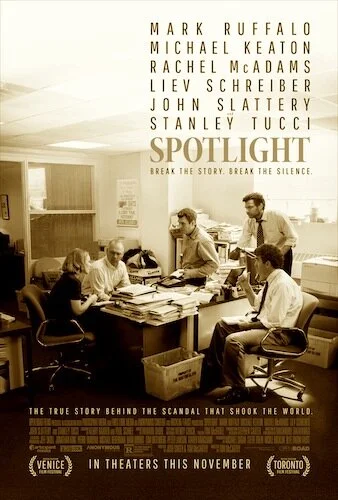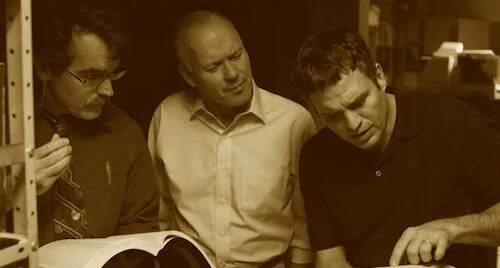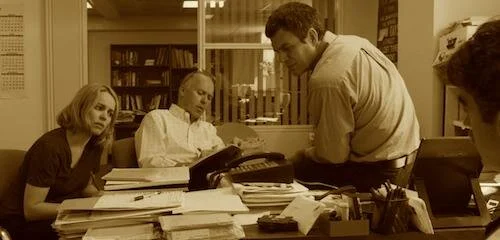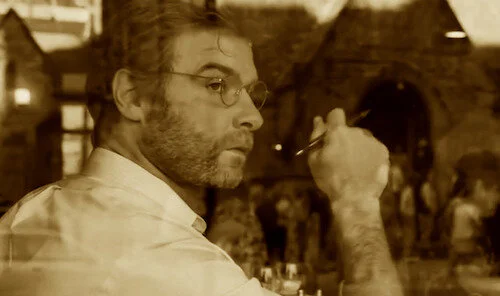Spotlight
This review is a part of the Best Picture Project: a review of every single Academy Award winner for the Best Picture category. Spotlight is the eighty eighth Best Picture winner at the 2015 Academy Awards.
After Birdman, The Revenant was ready to swoop in and create a rare back-to-back for Alejandro G. Iñàrritu. He won his second consecutive Best Director award. Emmanuel Lubezki was showing off at this point with his third Oscar for cinematography in a row. Even Leonardo DiCaprio finally won an Academy Award. All that was left was the big B.P.. We get there, and, as predicted, Spotlight wins. Wait, what? That's impossible. Spotlight only had one other Oscar that evening (Best Original Screenplay). The last time a Best Picture winner only had two awards at the Oscars was that terrible The Greatest Show on Earth fiasco (which, as we all know, was a deterrence from awarding a film shrouded by blacklisting controversy). Spotlight wasn't in the same scenario at all. What gives?
Well, believe it or not, what Spotlight won makes complete sense. It was the best film in the Best Picture roster (The Revenant was close behind, for sure). Its screenplay did drive the entire film. The rest of its parts, as sensational as they are, weren't showy enough to pick up other awards. Spotlight is an anomaly. It is far from safe or wimpy, but it never feels the need to guilt trip you, or increase emotions to drive a point. It exists as it is, and that is enough. The score is simple. The visuals are plain. The acting is mostly neutralized. Like the journalist team the film follows, Spotlight is all about being unbiased and delivering the facts. It does just that. Like being sucked into a mesmerizing piece of writing, Spotlight lets the story do all of the heavy lifting, and everything else falls into place, like you are picturing the writing in your mind.
You follow the Spotlight journalism team as they research a previously dropped case involving a claim of pedophilia against Catholic priest John Geoghan.
I am a sucker for films about journalism. Everything from the typewriter (or keyboard) clacking and the constant dialogue exchanges, down to the office doors closing and the stories being completed and sent off. Maybe it is just knowing that a story has to develop before your very eyes, thus ensuring a carefully written narrative. It could be the witty lines spewed by intellectuals that can't just hold a normal conversation. It might be because I write about movies, and it's like watching two of my passions go hand in hand. Something draws me in whenever I watch this "genre". With that in mind, Spotlight is one of the finest works of cinematic journalism (narratives, not documentaries) I've seen in years. Maybe ever.
Like all of the best films of this nature, Spotlight is great at creating a world for us to nestle into. The Boston Globe has ushered in a new editor during a time when printed press was starting to face the earliest signs of extinction, thanks to digital media. This editor digs deeply into the Globe to find out if they need to change the infrastructure for any reason (or to stay afloat if needed). He interviews the Spotlight team (a succinct group of very few people that work on exclusive stories that take months to publish). They work within the Globe, and their methods seem a little bit too particular through the eyes of someone that may need to make cuts down the road.
Seeing the extent that these journalists go through to get to the source makes Spotlight fulfilling and inspiring as a societal discussion-based piece.
A big project is plopped on the Spotlight desk: a revisitation of a case in which a priest was caught molesting children and faced zero severe repercussions. This topic has been dropped like a hot potato many times before, but no one really knows why. The Spotlight team is asked to try this story again. Without the film beating this fact over your head too much, deep down you know the team comply to see if they can get something new here, but also to keep their jobs. The deeper they go into this case, the uglier the city of Boston gets around them. What went from an unknown story is quickly revealed to be an agreed-upon secret by many people that respect an organization more than the lives of the abused.
Spotlight never has to over exert itself to tell a point. All you need are interviews, revelations, and pieces of evidence. Even during a major moment -- like realizing "sick leave" labels on official documents was a means of hiding which priests were kicked out of churches for sexual harassment -- is left without any damning music, extreme shots or zooms, or even dynamic cuts. In a year when the concept of fake news was making its rounds, and click bait headlines were already exhausted, a film that displays an ongoing scoop this naturally felt like a blessing. That's only when you watch it once. As a film meant to be revisited, no part sticks out as particularly awkward or uneven. Like the best novels, Spotlight is a source your mind can extract any interpreted reaction from. It doesn't even beg to be watched again. You may feel the need to play the film on your own accord, though, because of how unassuming it is. It's not even that old, and I can't tell you how many times I've watched Spotlight.
The Spotlight crew matching their own records with the phone call testimony, of which they are bearing witness.
The film does get a bit more "explosive" as it reaches its second half, but only as a means of developing a good film. As a story, it remains humble. Plus, the amount of twists that come your way is immeasurable. Anyone not reacting to this amount of news in some sort of way is a robot, and Spotlight is far from mechanical. Toss in one moment of bombastic acting ("It's time!"; what else?), and a montage to count down the days until the article is to be released, and, sure, Spotlight flexes its muscles a handful of times. Again, that's because of the heart that leaks after so many passing minutes of a work that tries to be about its state of mind only. It's only natural. Even the best essays have organic traits of the author(s) sewn in; no one likes static writing.
The film ends with anecdotes, just like any proper thesis. These "footnotes" carry the biggest punches of all, and they're just pieces of text. Then the credits come on, and it feels as though you have clicked onto a new page to see who came up with this piece. Somehow, a film where the credits feel as continuous as the entire feature is enough to leave you speechless. All you are left with are thoughts. How could a group allow so many innocent kids to be left alone, to live with this torment without help? How could a religion driven by morality not solve all of its evils (or even try)? How did we even get to this point, where this many cases went ignored?
Occasionally, Spotlight gets flashy, including this superimposition of a window’s reflection of a church looming over editor Baron.
Spotlight does just that. It spotlights. It lets the disturbing start of the 2000's United States remain intact, scorning those that abused children for too long, and applauding those that vowed to make a difference. The film itself whispered itself into existence, through the awards season, and into a new era. Tom McCarthy and gang probably don't care too much that Spotlight is not brought up all that often. They know what they have made is special in a singular way. Not many works can create so much momentum by simply being. How this doesn't feel like a bad TV movie, or a soap opera, I'm not sure. Restraint of this magnitude is almost miraculous, especially given the film's topic. How it doesn’t feel boring for a single second is another mystery. Spotlight is the very film that exemplifies the notion that, sometimes, the simplest things are what take the most amounts of talent and effort.
Andreas Babiolakis has a Masters degree in Film and Photography Preservation and Collections Management from Ryerson University, as well as a Bachelors degree in Cinema Studies from York University. His favourite times of year are the Criterion Collection flash sales and the annual Toronto International Film Festival.









